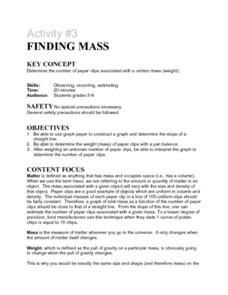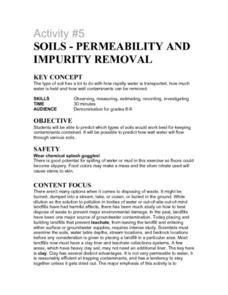Curated OER
The Electric Sieve
Students examine different mixtures and how they can be separated. In this electric sieve lesson students complete an activity that allows them to separate mixtures.
Curated OER
Indra Nooyi
In this Indra Nooyi instructional activity, students read about the life of the CEo of Pepsi, then complete a variety of comprehension activities. An answer key is included.
Curated OER
Sour Acids and Bitter Bases
Students explore acids and bases. They experience the sour taste of acids and the bitter taste of bases by tasting substances such as chocolate, lemon juice, and baking soda. in addition, they complete a worksheet for individual assessment.
Curated OER
Activity #3 Finding Mass
Students use graph paper to construct a graph and determine the slope of a straight line. They determine the weight (mass) of paper clips with a pan balance. Pupils weigh an unknown number of paper clips, and to interpret the graph to...
Curated OER
Condensation and the Water Cycle
Students explore the natural distallation process that occurs in the water cycle. They use plastic cups and cotton swabs to observe the condensation process that is evident in the water cycle.
Curated OER
Activity #5 Environmental Effects
Students explain the implications of particle theory of The Law of Conservation of Matter for problems of pollution and waste disposal. They describe, in terms of atoms and molecules, what happens to materials when they are dissolved or...
Curated OER
Some Common Chemical Reactions
In this chemical reactions activity, students compare and contrast corrosion and combustion reactions. This activity has 15 short answer questions.
Curated OER
Intermediate Sentence Completion 15
In this sentence completion activity, students read the sentences and choose the best word to complete each sentence. Students complete 12 sentences.
Curated OER
The Exceptional Nature of Cellulose
Students observe the affects of a substance's composition and structure have on its solubility. For this cellulose lesson students compare the amount of energy required to dissolve mono-saccharides with that required to dissolve...
Curated OER
Marie Curie
In this famous person worksheet, students read a passage about Marie Curie and then complete a variety of in-class and homework activities to support comprehension, including partner interviews, spelling, cloze, synonym...
Creative Chemistry
Making Ammonia - The Haber Process
In this fertilizer worksheet, students read background information about how farmers began using nitrogen compounds as fertilizer and how Fritz Haber developed an efficient process. Based on their reading, students complete 10 short...
Curated OER
Three Digit Addition
In this math worksheet, students solve three digit addition problems. Some of the addition problems require regrouping. The problems are set up to solve vertically.
Howard Hughes Medical Institute
The Making of the Fittest: Got Lactase? The Co-evolution of Genes and Culture
Got milk? Only two cultures have had it long enough to develop the tolerance of lactose as an adult. Learn how the responsible genes evolved along with the cultures that have been consuming milk. This rich film is supplied with a few...
Curated OER
Mini-Volcanoes!
Students define volcanoes and why they erupt. Using baking soda, vinegar, and soap detergent, students create and observe their own volcanoes erupting. A brain-pop video can be used to follow-up the activity (found on website).
Curated OER
Activity #17 Liquid Density and Temperature
Students comprehend that hot water rises up through cold water but cold water does not rixe in hot water. They comprehend that water at temperatures above 4oC decreases in density with increases in temperature. Students answer lab...
Curated OER
It Looks Like Champagne
Students determine some practical implications of the discovery of liquid carbon dioxide in deep-ocean ecosystems. They interpret phase diagrams and explain the meaning of "critical point" and "triple point."
Curated OER
Pigment Plucking
Pupils examine pigments found in different fruits and vegetables and practice the processes for extracting the pigments. Pigments are used to create artwork and a class PowerPoint presentation is made on the different types of plant...
Curated OER
What Changes Occur When Water Freezes?
Young scholars investigate the changes that occur at the molecular level when a liquid becomes a solid. They freeze water in baby jars and observe the changes that occur in the process.
Curated OER
Activity #5 Soils-Permeability and Impurity Removal
Middle schoolers predict which types of soils would work best for keeping contaminants contained. They comprehend that in the past, landfills have been one major source of groundwater contamination. Pupils comprehend that placing and...
Curated OER
Photosynthesis and Respiration
Eighth graders differentiate photosynthesis and respiration. In this biology lesson, 8th graders draw a diagram explaining these two processes. They answer a quiz after the lesson.
Maryland Science Center
Maryland Science Center: Caramel Chemistry [Pdf]
This activity demonstrates the Maillard Reaction, which explains how browning and flavor develop when something is cooked.
Royal Society of Chemistry
Royal Soc. Of Chemistry: Kitchen Chemistry: Chemical Changes During Cooking [Pdf]
Article, with embedded questions, describes the chemical changes that take place when meat is cooked when sugar is heated, and when fruits brown.
Royal Society of Chemistry
Royal Society of Chemistry: Kitchen Chemistry: Why Do Pans Stick? [Pdf]
Article about Teflon explains why foods stick to pans and poses questions about the chemistry that causes foods to bind to uncoated metals.
Royal Society of Chemistry
Royal Society of Chemistry: Kitchen Chemistry: Is All Salt the Same? [Pdf]
Lesson plan investigation into types of salts used to season foods and in recipes asks pupils to consider and whether advertisers' claims about their salt products are truthful.






















![Maryland Science Center: Caramel Chemistry [Pdf] Activity Maryland Science Center: Caramel Chemistry [Pdf] Activity](https://d15y2dacu3jp90.cloudfront.net/images/attachment_defaults/resource/large/FPO-knovation.png)